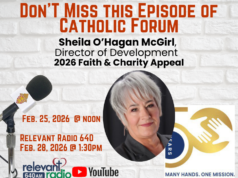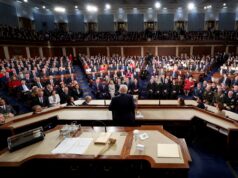
Beginning Monday, Aug. 25, more than 8,500 Catholic school students return to 19 elementary, eight high schools and three early child centers in Delaware and on Maryland’s Eastern Shore. For the Diocese of Wilmington, the 2025-2026 school year is underway.
Why Catholic school? Often as the new school year begins, there are questions asked about the WHY of Catholic school education? Why do we need Catholic schools, when free state education is available? There are multiple reasons that make Catholic school education imperative in our church and in our world.
- Catholic schools develop the personal relationship with the Lord that families have begun in their homes. Catholic schools ensure a daily personal encounter with Jesus.
- Catholic schools bring faith and culture into harmony. They help youth to connect life experiences with faith.
- Catholic schools are distinguished by academic excellence. Catholic schools in the diocese can attest to above average data in student performance, college admissions, scholarships and grants and other measures of successful schools.
- Catholic schools develop wisdom and technical skills, but also virtue and right behavior. They form the whole child.
- Catholic schools offer students a balanced worldview so that students possess ethical and social awareness. Students engage in issues of societal concern.
- Catholic schools are places of communion and community. They are places of trust and collaboration.
These attributes make the 30 schools of the Diocese of Wilmington Catholic, challenging and caring places to learn and grow.
What’s new on the docket this year? Each year there are always topics requiring consideration for the well-being of students and the teaching-learning process. This year is certainly no different.
- Artificial Intelligence (AI) – With the growth of opportunity for uses of AI across the curriculum in schools, there are also challenges to be addressed. This year the diocesan Catholic Schools Office, working with a committee of teachers, will update the “Acceptable Use Policy” for schools as well as develop guidelines regarding AI. Guiding students to navigate the technological world with faith, balance and responsibility is of utmost importance in education.
- Teacher Employment – Catholic schools, like other school systems, seek licensed and certified teachers for employment. The challenge of hiring qualified teachers has grown nationwide. As Catholic schools look for alternative sources for employment of teachers, such as those transitioning from employment in the sciences, technology and business, the Catholic Schools Office is developing a pathway to welcome them to teaching in Catholic education.
- Funding for Schools – Catholic schools rely on several sources for funding. Primarily, tuition is the basis for school finances. Tuition in parish and diocesan elementary schools is approximately $6,500 per student; in high schools it averages $16,600. Private school tuition generally exceeds these averages. The sacrifices of families, along with the support of parishioners and benefactors, added to tuition revenue provides for the actual cost of educating students.

The ACE Foundation, primarily assisting faith-based schools in several states, including Most Blessed Sacrament Catholic School and St. Francis de Sales School on the Eastern Shore of Maryland, has expanded into Delaware. The ACE Foundation supports students new to a school and funds that level of support for the length of time the students are in the school. The ACE Foundation now accepts Delaware schools and Saint Mark’s High School, Holy Cross High School and Holy Angels School will benefit from it this year.
The Educational Choice for Children Act (ECCA), also looms on the horizon this year. Recently signed into law, this federal legislation creates a $5 billion nationwide scholarship fund providing a 100% federal tax credit for donations to Scholarship Granting Organizations (SGO). Donors may receive a tax credit for the maximum of $5,000 or 10% of their adjusted gross income. Families may apply to the SGO in their state for funds for school choice. This law, if a state chooses to participate, can provide significant support to families seeking a Catholic school education.
Each of these three initiatives holds the potential of significant and valuable growth for Catholic schools, ultimately benefitting the students and their families.
What can I do? This question is important since Catholic education is a mission of the church. Families of Catholic school students and parishioners at large can support Catholic school education in various ways.
- Pray for the success of Catholic schools. The success of Catholic education is critical to the future of the church and society.
- Follow the news, especially as it relates to the “Educational Choice for Children Act.” Every taxpayer can be a financial benefactor of Catholic schools simply by directing their federal tax credit to an SGO.
- Connect with a Catholic school. Whether or not you have a student in a Catholic school, get to know one. Call, visit or read online about Catholic school education. Consider getting involved as a volunteer, benefactor or friend.
The theme for Catholic schools in the Diocese of Wilmington this school year is “By Name You Are Called.” Each of us has been called by the Lord to form missionary disciples. Catholic schools are one place where this occurs. Will you respond “Yes” to the invitation in some way?











